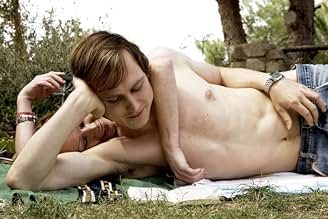IMDb RATING
6.6/10
4.2K
YOUR RATING
While on a Mediterranean vacation, a seemingly happy boyfriend and girlfriend find their connection to one another tested as they bond with another couple.While on a Mediterranean vacation, a seemingly happy boyfriend and girlfriend find their connection to one another tested as they bond with another couple.While on a Mediterranean vacation, a seemingly happy boyfriend and girlfriend find their connection to one another tested as they bond with another couple.
- Awards
- 7 wins & 19 nominations total
- Director
- Writer
- All cast & crew
- Production, box office & more at IMDbPro
Featured reviews
Maren Ade has set a German "Kammerspiel" in sunny Sardinia; a Dogma-looking, Eric Rohmer-inspired account of a young couple on vacation in a big, beautiful house - and their reluctant, but increasingly blatant attempts at penetrating each other's bodies and souls. She loves him. Does he love her?
"Alle Anderen" is not pitch-perfect (and has been received with varied reactions - from a posh Jury Grand Prix in Berlin '09 to fairly feeble reviews). Indeed, it's a bit too long for its own good and strangely uneven at times. But at one point, you just surrender to the subtle narrative and the complex, fully fleshed out characters (needless to say, Birgit Minichmayr and Lars Eidinger are phenomenal in the leads. Their performances look so simple, so easy-to-pull-off).
Maren Ade has accomplished the difficult stunt of putting the audience in the very same room, at the same intense wave-length, as these searching, anxious people. She allows us to eavesdrop to cunning conversations, to witness a constant (if not always visible) emotional struggle. And she keeps a shrewd surprise for the very end, suddenly pulling the rug from under our feet, forcing us to re-evaluate everything we've seen and heard up until this point.
The sound of silence can be damaging. Tears and laughter can be emancipating. Because in the end, it's all about love.
"Alle Anderen" is not pitch-perfect (and has been received with varied reactions - from a posh Jury Grand Prix in Berlin '09 to fairly feeble reviews). Indeed, it's a bit too long for its own good and strangely uneven at times. But at one point, you just surrender to the subtle narrative and the complex, fully fleshed out characters (needless to say, Birgit Minichmayr and Lars Eidinger are phenomenal in the leads. Their performances look so simple, so easy-to-pull-off).
Maren Ade has accomplished the difficult stunt of putting the audience in the very same room, at the same intense wave-length, as these searching, anxious people. She allows us to eavesdrop to cunning conversations, to witness a constant (if not always visible) emotional struggle. And she keeps a shrewd surprise for the very end, suddenly pulling the rug from under our feet, forcing us to re-evaluate everything we've seen and heard up until this point.
The sound of silence can be damaging. Tears and laughter can be emancipating. Because in the end, it's all about love.
The thinking is too obvious. Get a couple of well built people to talk for two hours, with some (uninspiring) nudity thrown in and no one has to find too much money to produce something that looks like a movie. There are so many film festivals, one of them is bound to play it.
Fraulein Minichmayr is lively enough and she's been in some real films (Downfall, Perfume)so her first scene with the little girl holds hope - "Tell me why you think I'm so awful." Co star Eidinger as an architect offers a chance for some comment on taste and style which fail to impress.
Production values are in the competent unimpressive bracket.
It was the end of the Sydney Film Festival but this was not the movie to offer an audience which had just been blackjacked with the ridiculous Ming-liang Tsai VISAGE. Have they no mercy? Even film festival subscribers deserve pity.
Fraulein Minichmayr is lively enough and she's been in some real films (Downfall, Perfume)so her first scene with the little girl holds hope - "Tell me why you think I'm so awful." Co star Eidinger as an architect offers a chance for some comment on taste and style which fail to impress.
Production values are in the competent unimpressive bracket.
It was the end of the Sydney Film Festival but this was not the movie to offer an audience which had just been blackjacked with the ridiculous Ming-liang Tsai VISAGE. Have they no mercy? Even film festival subscribers deserve pity.
A very realistic tale about two people living on different frequencies and the shame and misunderstanding about and with the people you intend to be the nearest with. Told in front of a beautiful setting by breathtakingly great but unagitated and subtle actors. One of the must-see German films.
A young German couple is on a business/vacation trip in Sardinia. They don't much like each other. They pretty much argue and snipe at each other constantly. They probably, in fact, should just get a divorce. Oh, wait: they're not married. So why the Hell are they even together? These two people just need to move the Hell on. The film really does understand its characters quite intimately, and the lead actors (Birgit Minichmayr and Lars Eidinger) are good, but so what? These people are just not worth caring about or observing in any way whatsoever. The movie moves very slowly and is basically the equivalent of hanging out with horrible people for a very, very long two hours. Terrible.
Similar in style and tone to last year's "Blue Valentine," the German film "Everyone Else" provides us with an oblique look at a troubled relationship. Though the couple in this film does not seem as overtly unhappy as the one in the American work, there is still something clearly eating away at their relationship. The most admirable aspect of the screenplay by Maren Ade is that it doesn't throw easy labels onto either the characters or the problems they're facing. The movie is really more a piece of objective reportage chronicling their lives over the course of a few days than a plot- and theme-driven narrative leading us to a preordained conclusion about them as people.
Chris (Lars Eidinger) is a gifted but apparently not very successful architect, while Gitti (Birgit Minichmayr), his girlfriend, who works in the recording business, seems to be generally supportive of his efforts. Chris and Gitti are spending a relaxing vacation at his mother's home on the Mediterranean, when Gitti begins to off-handedly question Chris's masculinity (we assume that it has more to do with his lack of initiative and drive than with his personal mannerisms). In response, Chris begins to treat Gitti in an ever more callous fashion, trying to prove her wrong by acting in the dismissive and domineering way he assumes "real" men do, and in the way, if Gitta is any indication, women apparently want them to.
But this synopsis really only covers the tip of the iceberg, for there are clearly many more complex dynamics taking place within this relationship that are not so easily delineated and described. Suffice it to say that the movie explores the myriad elements that go into relationships, and does so without spelling them out in simplistic terms and without passing judgment on the characters. The parameters within which any relationship must be set are still evolving and fluid in the case of Chris and Gitti, and this leads to much pushing of the boundaries and behavioral experimentation on the part of the couple throughout the course of the film. Ade's direction is unobtrusive and observational in nature, which allows the actors to interact with one another in a quasi-improvisational and thus wholly believable fashion.
There is, however, a definite downside to this type of storytelling – "Blue Valentine" suffered from it as well – and that is that the motivations for the characters' actions are often so murky and inexplicable that they can seem downright arbitrary to those of us who are watching all of this unfold from the outside in. That's why Chris and Gitti strike us as being more weird and annoying – if not downright daffy - than anything else at times.
Thus, your initial response might be to assume that perhaps Chris and Gitti simply aren't meant for one another and that they might think about looking elsewhere for a relationship. But, then again, if it were that easy to get out of a troubled relationship, we'd have no need in the first place for films like "Everyone Else."
Chris (Lars Eidinger) is a gifted but apparently not very successful architect, while Gitti (Birgit Minichmayr), his girlfriend, who works in the recording business, seems to be generally supportive of his efforts. Chris and Gitti are spending a relaxing vacation at his mother's home on the Mediterranean, when Gitti begins to off-handedly question Chris's masculinity (we assume that it has more to do with his lack of initiative and drive than with his personal mannerisms). In response, Chris begins to treat Gitti in an ever more callous fashion, trying to prove her wrong by acting in the dismissive and domineering way he assumes "real" men do, and in the way, if Gitta is any indication, women apparently want them to.
But this synopsis really only covers the tip of the iceberg, for there are clearly many more complex dynamics taking place within this relationship that are not so easily delineated and described. Suffice it to say that the movie explores the myriad elements that go into relationships, and does so without spelling them out in simplistic terms and without passing judgment on the characters. The parameters within which any relationship must be set are still evolving and fluid in the case of Chris and Gitti, and this leads to much pushing of the boundaries and behavioral experimentation on the part of the couple throughout the course of the film. Ade's direction is unobtrusive and observational in nature, which allows the actors to interact with one another in a quasi-improvisational and thus wholly believable fashion.
There is, however, a definite downside to this type of storytelling – "Blue Valentine" suffered from it as well – and that is that the motivations for the characters' actions are often so murky and inexplicable that they can seem downright arbitrary to those of us who are watching all of this unfold from the outside in. That's why Chris and Gitti strike us as being more weird and annoying – if not downright daffy - than anything else at times.
Thus, your initial response might be to assume that perhaps Chris and Gitti simply aren't meant for one another and that they might think about looking elsewhere for a relationship. But, then again, if it were that easy to get out of a troubled relationship, we'd have no need in the first place for films like "Everyone Else."
Did you know
- SoundtracksTo All The Girls I've Loved Before
Written by Albert Hammond and Hal David
Performed by Julio Iglesias and Willie Nelson
- How long is Everyone Else?Powered by Alexa
Details
- Release date
- Country of origin
- Official sites
- Languages
- Also known as
- Todos los demás
- Filming locations
- Production companies
- See more company credits at IMDbPro
Box office
- Gross US & Canada
- $102,042
- Opening weekend US & Canada
- $10,810
- Apr 11, 2010
- Gross worldwide
- $2,634,462
- Runtime
- 1h 59m(119 min)
- Color
- Sound mix
- Aspect ratio
- 1.85 : 1
Contribute to this page
Suggest an edit or add missing content


























